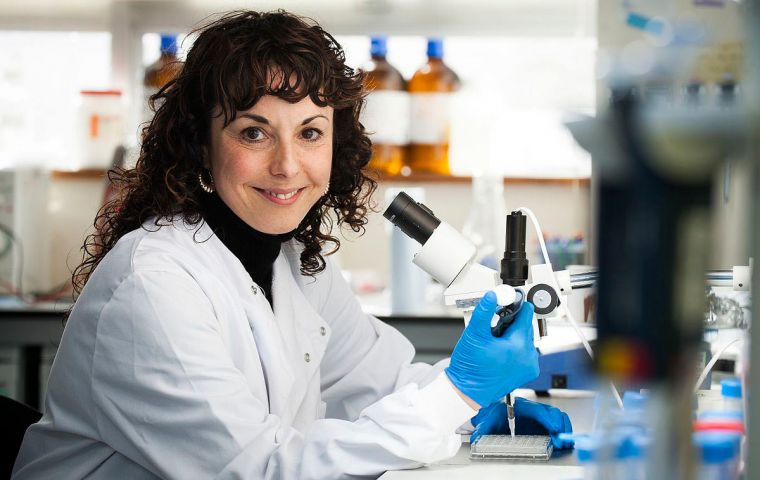MercoPress. South Atlantic News Agency
“Ground break” in tackling protein defect that causes Huntington's disease
 Lead researcher Prof. Sarah Tabrizi, from University College London, said the drug's capacity to lower levels of a toxic protein was “ground-breaking”.
Lead researcher Prof. Sarah Tabrizi, from University College London, said the drug's capacity to lower levels of a toxic protein was “ground-breaking”.  Ionis Pharmaceuticals Senior research vice-president Frank Bennett, said the protein reductions observed in the study “substantially exceeded our expectations”
Ionis Pharmaceuticals Senior research vice-president Frank Bennett, said the protein reductions observed in the study “substantially exceeded our expectations”  “The question is whether this is enough to make a difference to patients and their clinical course,” said Roger Barker of the University of Cambridge
“The question is whether this is enough to make a difference to patients and their clinical course,” said Roger Barker of the University of Cambridge Scientists have for the first time corrected a protein defect that causes Huntington's disease, by injecting a drug into the spine, offering new hope for patients with the devastating genetic disease. Lead researcher Sarah Tabrizi, professor of clinical neurology at University College London, said the ability of the drug to tackle the underlying cause of Huntington's by lowering levels of a toxic protein was “ground-breaking”.
“The key now is to move quickly to a larger trial to test whether [it] … slows disease progression,” she said in a statement.
Senior vice-president of research Frank Bennett from Ionis Pharmaceuticals, which developed the drug, said the protein reductions observed in the study “substantially exceeded our expectations” and that the drug was also well tolerated.
However, some experts cautioned the results were still early and the ability of the new medicine to improve clinical outcomes for patients had yet to be demonstrated.
“The question is whether this is enough to make a difference to patients and their clinical course, and for that we will have to wait for bigger trials,” said Roger Barker of the University of Cambridge, which was also involved in the research.
The findings of the research have not yet been published in a journal or presented at a conference.
Professor Bryce Vissel, The Roth Fellow and director of the Centre of Neuroscience and Regenerative Medicine at the University of Technology Sydney, agreed while there was a long way to go, this was a very important moment for science.
“This really heralds the beginning of a new era in the treatment of diseases in the brain and spinal cord where there is a specific known gene mutation.” he said.
“Much more work is needed but it's a huge, extraordinary result in its own right.
”Just the result of knocking down a gene in the human brain, a gene that is known to cause this devastating disease, is a major step forward … it's got implications for a range of diseases of the brain and spinal cord.”
Huntington's is a progressive neurodegenerative disease affecting mental abilities and physical control that normally hits sufferers between the ages of 30 and 50 years before continually worsening over a 10- to 25-year period.
There is currently no effective disease-modifying treatment for the condition, with existing medicines focused only on managing disease symptoms.
The success in the early-stage clinical trial prompted pharmaceutical company Roche to exercise its option to license the product, called IONIS-HTT(Rx), at a cost of $US45 million ($60 million).
The drug uses an approach called antisense to stop a gene producing a particular protein. The technique has already led to a drug for spinal muscular atrophy that was approved last year.




Top Comments
Disclaimer & comment rules-

Read all commentsThat's great news. One of the more horrible and devastating diseases, and there was no obvious way to treat it before this.
Dec 13th, 2017 - 11:10 pm 0Commenting for this story is now closed.
If you have a Facebook account, become a fan and comment on our Facebook Page!